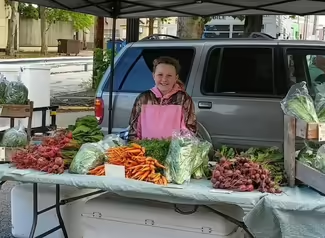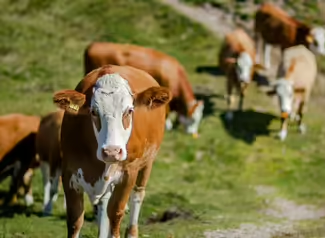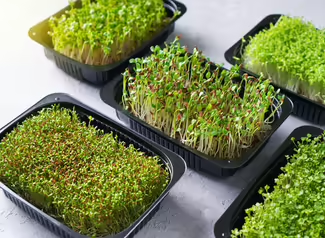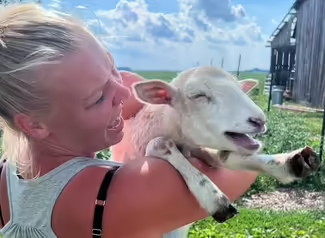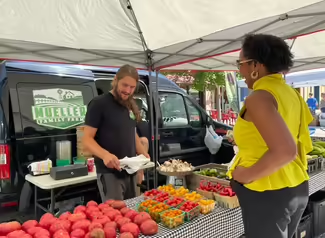
A class project changed how Clint Bland looks at food.
As part of an ecology course, Clint tried to find a more sustainable way of living by eating only locally grown food for a month.
He couldn’t. With summer over, he couldn’t rely on local foods from farmers markets or home gardens. As he read the grocery store food labels, Clint wondered, “What is going on in this world?”
That was the beginning of Clint’s inspiration for a regional food movement.
“I remember reading of the 1940s; you ate what was in season,” Clint says. “You couldn’t wait for that strawberry or apple when it became available. You couldn’t just go to the store and get whatever you wanted whenever you wanted.”
Clint wondered how he could change the way he fed his family and his neighbors. At that time, he didn’t have a farm, only a small garden.
“I got more fascinated with the idea of figuring out how I could produce as much of the food on my plate as possible,” Clint says. “How neat would that be.”
The beginning of Bland Family Farm
In 2016, Clint and his wife, Marcella, expanded their garden into a farm while he continued working off the farm. Bland Family Farm now provides the Jacksonville area with organic meat, eggs, and produce.
“Our mission is to grow our food as nature intended — naturally,” Clint says.
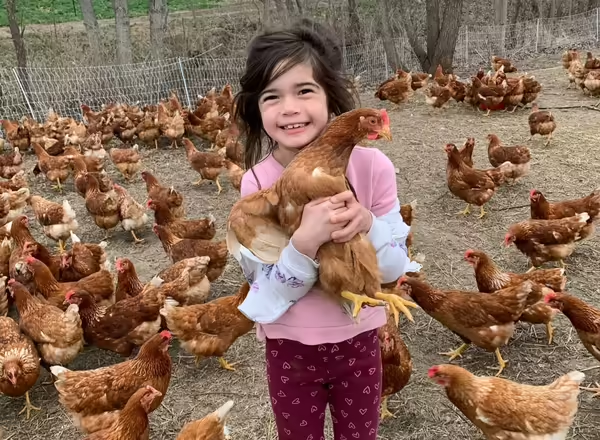
The pandemic allowed the family time to grow the farm and expand its home-delivery production. When it was time to fully return to the office, Clint faced a decision.
Clint says he was overwhelmed trying to be a good employee and managing a farm, as well as being a good husband and father.
“My love for that job wasn’t there,” Clint says. “I wanted to create great food and sell it.”
It has been three years since he stepped away from the security of his outside employment to full-time farming.
“I want to produce the most nutrient-dense food possible,” Clint says. Animals are grass-fed and vegetables are grown without chemicals.
Enter the IL-EATS support lifeline
In mid-2024, Clint learned of the Local Food Purchase Assistance program which provides funds to local agencies and community partners to buy locally produced fresh foods at market value. In Illinois, that program operates as IL-EATS, the Illinois Equitable Access Towards Sustainable Systems program. IL-EATS builds collaborations across a local food network to provide culturally responsive fresh foods to food-insecure communities. Growers have a consistent market within a community they know well.
The program aligns with the Bland Family Farm’s goals and priorities, and the new revenue source would improve the farm’s financial footing. There was a big challenge, though; foodbanks have packaging and other restrictions that his direct-to-consumer business didn’t use.
Clint knew a lot about supply chain management and distribution from his previous work with a large Illinois-based food redistribution company. He quickly learned how much he didn’t know when he began integrating the foodbanks’ guidelines, such as packaging and labeling, into the farm’s processes.
“As farmers, we overcome obstacles,” Clint says. “Every day, we figure out how to solve problems.”
That’s when the big idea came.
Aggregating Illinois farm products
With what Clint learned about packaging and labeling, he knew he could assist other farmers who were struggling with the same distribution, packaging, and labeling issues.
“What if we helped handle that for them?” Clint imagined. He began bringing together like-minded farmers who offered diverse farm products. He visited farms to ensure producers shared his commitment to using regenerative farm practices.
Currently, nine farms are part of The Farms of Illinois collective. Clint wants 50.
“It’s a value-added service for these farmers.”
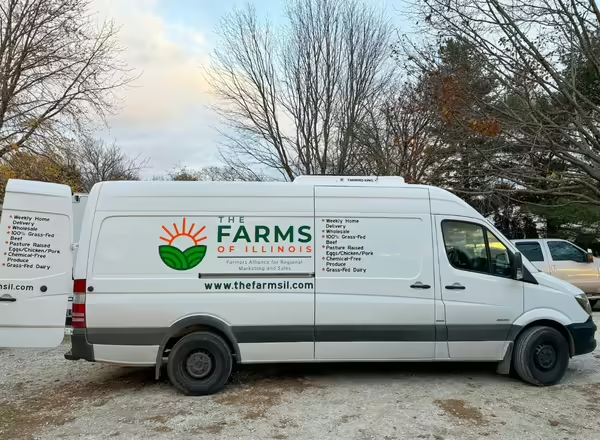
In addition to Bland Family Farm, cooperating farms include Abundant Pastures of Claremont, Buckhorn Dairy of Mount Sterling, Heirloom Haus of Pawnee, Itty Bitty Micro Farm of Springfield Lemay Mushroom Operation of Springfield, Mueller Family Farm of Bluffs, Oak Tree Organics of Ashland, and Twin Willow Farms of Roodhouse.
He helps farmers develop marketing and labels for their products. He hopes The Farms of Illinois branding soon carries the same impact for consumers as the USDA organic sticker.
Products from all farms are posted on a shared website. Consumers know which farm they are buying from when they place their orders. There are currently more than 150 products available with some redundancy of product offerings to ensure a steady supply for consumers.
Orders close at 5 Sunday evening, then Clint notifies each farm how much product to deliver to him on Monday. Clint distributes to private-order customers and wholesale accounts within a 2-hour radius of Jacksonville each Tuesday.
Foodbanks see big benefits
In the three months since the creation of The Farms of Illinois, Clint has built new relationships with six food-assistance organizations operating as awardees of IL-EATS, including Midwest Food Bank of Illinois-Peoria, Operation Food Search in St. Louis, Northeast Community Fund in Decatur, Central Illinois Foodbank in Springfield, and St. Louis Area Foodbank that have funding to pay retail price for the locally grown products.
Clint also handles all foodbank deliveries for The Farms.
“It just made sense; instead of nine different farmers showing up, foodbanks now only have to deal with one truck with one delivery,” he says.
Foodbanks make up 50 percent of his business. Clint understands that once the grant ends, foodbanks may no longer be able to pay retail price, so he’s reaching out to other outlets, including local school districts.
Improving school lunches
Clint is driven to convince more schools to switch from large food distributors to local food producers. He also encourages schools to reduce their disposable plastic footprint and the amount of processed foods served in lunchrooms.
He hosted a group of school nutritionists at the farm in October to discuss the benefits and opportunities of buying locally sourced foods. Grant funds have recently become available to assist schools through the Local Food for Schools Program.
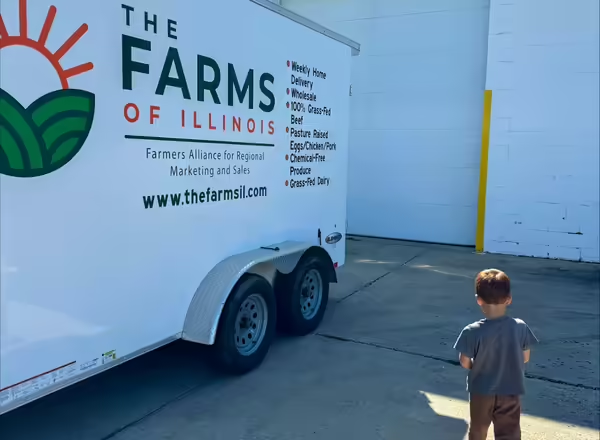
“The goal is to create high-quality food without spending more,” Clint says. Already school officials say that students are choosing to stay on campus for lunch instead of eating from fast food restaurants. “The vending machine supplier in one school used to come every week; now he only comes once a month.”
The Lincoln school district purchases 2,100 pounds of ground beef and 800 pounds of chicken a month, as well as dozens of eggs a week. Others are scheduling turkeys and sweet potatoes for their Thanksgiving lunches.
He recently convinced the school his own children attend to purchase from The Farms.
“I think the happiest moment I’ve had through this process was my first delivery to schools,” Clint says. “I don’t think I’ve ever felt so much joy knowing the kids at the high school were eating our food.”
New possibilities from IL-EATS
“Farmers are super happy to have this partnership with The Farms,” Clint says. “They’re good at farming, not so good at the marketing and packaging. They’re happy for the value we’re adding to their products.”
Reimbursement through USDA often takes two to three months. Clint doesn’t want the cooperating farms to wait that long, so he personally covers the early disbursement of sales as they occur.
The new revenue has allowed Clint to purchase a refrigerated van instead of using coolers during deliveries. In addition to convenience, the van provides greater food safety security.
He currently runs the business out of his home and garage and rents freezer space from local processors. With the additional revenue from IL-EATS, he purchased an 8,000-square-foot commercial building that will provide warehouse and operational space to house all post-harvest equipment, supplies, and cold storage, as well as allow room for expansion.
There are more challenges to overcome as he looks to expand wholesale offerings. He’s trying to figure out how to include a bar code on produce that doesn’t use plastic bagging. Bib ties may provide an answer, but the minimum order is 10,000.
“You can’t sell to Hy-Vee without a bar code,” Clint says, “but, I don’t think there’s a challenge I can’t overcome.”
Without the grant, Clint says he and the farms he’s working with would not be where they are today. They’ve hired two new employees to help with marketing and growing the wholesale business.
“I’ve been able to bring on good people and pay them a good wage,” Clint says. “That’s how you do it right.”

